 Below is a summary of the most recent Texas legislative updates 2013 as they relates to Criminal Law:
Below is a summary of the most recent Texas legislative updates 2013 as they relates to Criminal Law:
– In an attempt to reduce wrongful convictions in Texas, Senate Bill 1611 requires prosecutors to open their files to defendants and keep records of evidence they disclose. While the United States Supreme Court has long required prosecutors to disclose evidence that is “material either to guilt or punishment,” Senate Bill 1611 requires disclosure of not only all police reports and witness statements, but also any other evidence that is material to any matter regardless of whether such evidence is “material to guilt or punishment.”
– Senate Bill 344 allows courts to overturn convictions in cases where the forensic science that originally led to the verdict has changed. During an appeals process, Senate Bill 344 authorizes courts to grant relief on applications for writs of habeas corpus if there is currently available relevant scientific evidence that was not available at the time of conviction. The current relevant scientific evidence is only admissible if the evidence was not ascertainable through reasonable diligence at the time of trial.
– Senate Bill 1238 authorizes the Texas Forensic Science Commission to investigate unaccredited forensic disciplines such as arson, fingerprinting, breath-alcohol testing, ballistic examinations, and unaccredited entities.
– House Bill 1847 requires prosecutors to complete at least one hour of ethics training relating to the duty to disclose exculpatory and mitigating evidence.
– Under Senate Bill 825, an exoneree is permitted to file a grievance up to four years following release from prison against a prosecutor alleged to have violated the ethics rule regarding the duty to disclose. This bill further prohibits a private reprimand for such a violation.
– In an effort to reduce the possibility of a false confession being admitted at trial by a person who does not speak or understand English, House Bill 2090 requires that a written statement by an accused be in the language that he or she can read and understand before it can be admitted as evidence in a criminal proceeding.
– Upon a second conviction for a “sexually violent offense” against a child under the age of 14, House Bill 1302 requires an automatic life sentence in prison without parole. Furthermore, House Bill 1302 specifically prohibits registered sex offenders from working at amusement parks or seeking employment as cab, bus, or limousine drivers.
– Under Senate Bill 124, the offense of Tampering With A Governmental Record is enhanced from a Class A misdemeanor to a 3rd Degree Felony if the governmental record was a public school record, report, or state-mandated assessment instrument. If the actor’s intent was to defraud or harm another, the offense is enhanced instead to a 2nd Degree Felony.
– In an effort to address human trafficking, House Bill 8 enhances all Prostitution offenses from a Class B misdemeanor to a 2nd Degree Felony if the person solicited is younger than 18, regardless of whether the actor knew the age of the person solicited at the time of the offense. House Bill 8 also significantly alters the definition of the crime of Possession of Child Pornography. Accordingly, a person commits the crime of Possession of Child Pornography if they knowingly or intentionally “access with the intent to view” child pornography.
– If the underlying official proceeding in a criminal case involves family violence, Senate Bill 1360 enhances the penalty to the greater of a 3rd Degree Felony or the most serious offense charged in the criminal case. Senate Bill 1360 also provides a statutory forfeiture-by-wrongdoing provision, which specifies that a party to any criminal case, who causes a witness to be unavailable for trial through his wrongful acts, forfeits the right to object to the admissibility of evidence or statements based on the unavailability of the witness.
– Senate Bill 275 enhances the penalty for the offense of leaving the scene of an accident resulting in the death of a person from a 3rd Degree Felony to a 2nd Degree Felony. – Upon conviction for a 1st Degree Felony Engaging in Organized Crime offense, Senate Bill 549 enhances the minimum penalty from five to fifteen years in prison. In addition, there is an automatic life sentence without parole upon conviction of Engaging in Organized Crime if the underlying offense is an Aggravated Sexual Assault and the defendant is 18 or older and the victim was either younger than six; or if the victim was younger than 14 and the person caused serious bodily injury or placed the victim in fear of death, serious bodily injury, or kidnapping; or if the victim is younger than 17 and suffered serious bodily injury.
– House Bill 2539 places a duty on computer technicians to immediately report the discovery of an image on a computer that is or appears to be child pornography. It is a Class B misdemeanor offense if the computer technician fails to make such report.
– Senate Bill 12 suspends evidentiary Rules 404 and 405 in trials for certain sex offenses by allowing the admission of evidence during the guilt-innocence phase of the trial regarding a separate enumerated sex offense that the defendant has committed. While evidentiary Rules 404 and 405 prohibit the use of evidence of a person’s character or character trait to prove that on a particular occasion the person acted in accordance with the character or trait, Senate Bill 12 allows such evidence for any bearing the evidence has on relevant matters, including the character of the defendant and acts performed in conformity with the character of the defendant. Senate Bill 12 further requires the trial judge to make a determination that the defendant committed the separate offense beyond a reasonable doubt prior to the introduction of this evidence and outside the presence of the jury.
– Senate Bill 2 was passed in an effort to address the United States Supreme Court’s decision in Miller v. Alabama, which held that mandatory sentences of life in prison without the possibility of parole are unconstitutional for juvenile offenders (those under the age of 18). This posed a unique issue for 17 year olds in Texas, who are treated as adults and not juveniles. Prior to the passage of Senate Bill 2, the only punishment available for an individual (17 and older) who was convicted of capital murder was either an automatic life sentence in prison without the possibility of parole or the death penalty. In an effort to address the unconstitutionality of this punishment on those younger than 18, Senate Bill 2 provides that an individual younger than 18 who is convicted of capital murder be punished with an automatic life sentence in prison with the possibility of parole.
– House Bill 434 expands the list of those who are authorized to draw blood from an individual during a DWI investigation. Under previous law, only a physician, qualified technician, chemist, registered nurse, or licensed vocational nurse was authorized to take a blood specimen at the request or order of a peace officer for purposes of intoxication-related offenses. Now, the list of those authorized to draw blood also includes emergency medical technicians and paramedics. This bill allows for a person’s blood to be drawn without having to transport the individual to a separate facility, such as a hospital, during an intoxication-related investigation.
– House Bill 1862 removes switchblade knives from Texas’ prohibited-weapons statute. There are no longer criminal consequences to possessing, manufacturing, transporting, repairing, or selling a switchblade knife.
– Senate Bill 821 brings Texas law up to date by adding “hot drafts” to “hot checks” statutes to allow prosecution of those who pay with hot drafts by adding “sight order,” along with checks, for purposes of theft by check to allow prosecution for insufficiently funded electronic transfers or “hot drafts.”
If you have a question about how these changes in the law might affect your criminal case, please call us at (817) 993-9249.
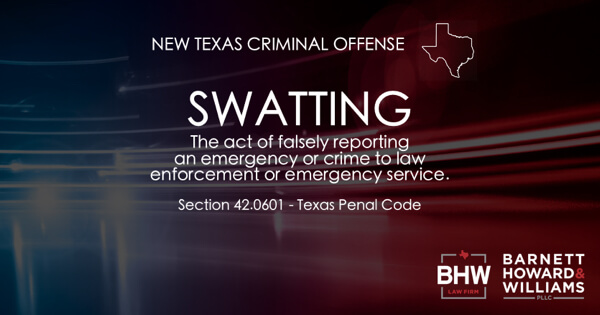
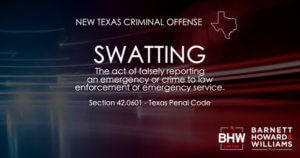 Texas legislators enacted several new criminal laws in the 2021 legislative session. Below, we highlight one of them – Swatting. Being from Texas, I initially thought this might have something to do with mosquitoes, but, as it turns out, Swatting is the act of falsely reporting a crime or emergency to law enforcement or emergency personnel. This new offense is a Class A misdemeanor unless the prosecutor can show that you’ve been convicted of this same offense in the past.
Texas legislators enacted several new criminal laws in the 2021 legislative session. Below, we highlight one of them – Swatting. Being from Texas, I initially thought this might have something to do with mosquitoes, but, as it turns out, Swatting is the act of falsely reporting a crime or emergency to law enforcement or emergency personnel. This new offense is a Class A misdemeanor unless the prosecutor can show that you’ve been convicted of this same offense in the past.
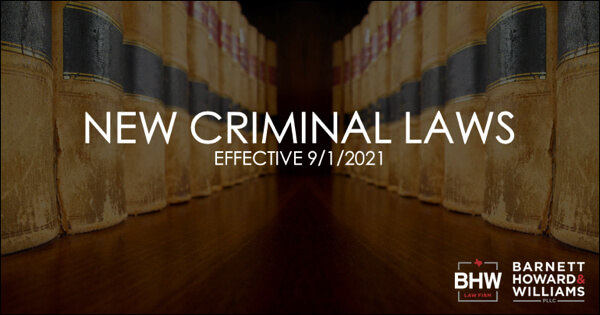
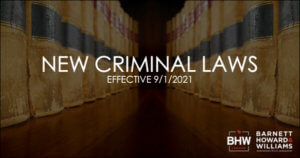 The 2021 Texas legislative session has now closed and there were several updates to our criminal statutes. Below are some of the more notable changes or additions to Texas criminal laws that took effect on September 1, 2021:
The 2021 Texas legislative session has now closed and there were several updates to our criminal statutes. Below are some of the more notable changes or additions to Texas criminal laws that took effect on September 1, 2021: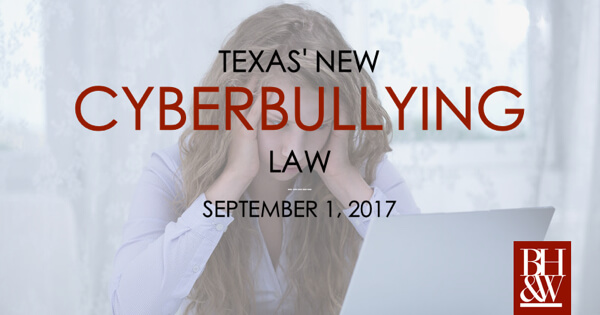
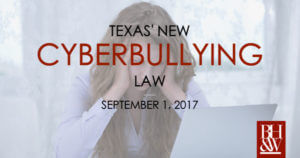 On June 9, 2016, the
On June 9, 2016, the 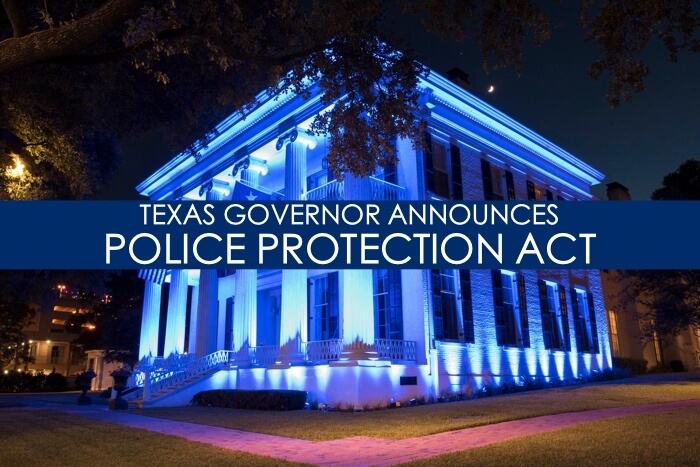
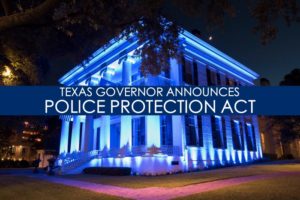 On Monday,
On Monday, 
 Below is a summary of the most recent Texas legislative updates 2013 as they relates to Criminal Law:
Below is a summary of the most recent Texas legislative updates 2013 as they relates to Criminal Law:





